#imparting culture
Text
Making Huizhou inksticks (徽墨), famous for its high quality.
Notes:
The characters OP pressed into the inksticks are 山白, OP's username
The "internal heat" referred to in the video is a term in Traditional Chinese medicine referring to a cause of inflammation, swelling, twitching, etc.
[eng by me]
3K notes
·
View notes
Text
sokka hates the fire nation but nonetheless subscribes to their logic through internalizing his own dehumanization, albeit in the name of sacrificing what is necessary to resist imperialism. on the other hand, aang refuses to sacrifice his humanity, which is intrinsically tied to the culture that was deemed deserving of extermination, and by recognizing the fullness of his personhood and his intrinsic right to exist, he defeats the tenets of imperialism on an ideological battleground. that is why it is so crucial that aang’s influence over sokka, as an air nomad, and as someone who did not grow up under the looming shadow of colonialism and genocide, is what helps him regain the childhood he had forsworn in the name of war—his laughter, his joy, and his humanity.
#aang&sokka#aang#sokka#obviously aang performs this function for every principal member of the gaang#with katara it’s immediate (see: penguin sledding 5 minutes after meeting)#and with toph it’s less pronounced (id argue that sokka is more crucial to tophs process of valuing her humanity than aang although aang#lays the groundwork for it by being the one to recognize her potential)#and with zuko he has also been dehumanized by the fire nation but like. it’s not the same of course#whereas sokka and aang have largely been dehumanized in the same way#as victims of genocide#and obviously katara too#but katara has the same viewpoint as aang from the beginning#that she deserves to exist and fights for her cultural values#whereas sokka thinks that KATARA deserves to exist. that everyone does EXCEPT himself#so aang’s influence reminds him that he’s NOT uniquely disposable/sacrificial/unworthy#he’s a person too!#and he does so through the simple bond of friendship. through joy & laughter & fun#the values that were instilled into him by the air nomads#and it’s not like sokka COMPLETELY internalizes it#or that aang is the only one who attempts to impart this lesson#but it’s why their friendship is so important#because sokka accepts imperialist logic and aang refuses to#aang’s importance cannot be overstated#which is kind of funny to say bc he is the protagonist. the titular role#but ppl like to ignore that#which is crazy . but whatever
529 notes
·
View notes
Quote
My feelings may inconvenience you. They may require patience. They may require you listening and learning about me and, maybe, after all that listening and learning and patience and kindness, you will feel the exact same way, philosophically and politically, about everything. But open empathetic dialogue is valuable. Admitting you might be wrong and you're doing your best is valuable. Giving someone else the space to be wrong without having to prove yourself right is valuable. Feelings are valuable. Facts don't care about your feelings, but I am NOT a fact. I care about your feelings.
CJ The X’s Video Essay “Bo Burnham vs. Jeff Bezos”
#EVERYTHING that video essay talks about is just. wow#it's so accurate to my experiences all the talk of internet culture and the ways it affects you even when you're not on the internet#but this part is not only about my experiences it's also about what i believe and have believed for years now#i'm very glad that this is part of the messages this essay imparts
8 notes
·
View notes
Text
//
#; speak writer#i have more shit i'm sorry not sorry#so age-wise ffxv!Jo left Galahd with her dad when she was 8 and can remember what life was then#she remembers the customs the culture the environment#on top of things Stian imparted to her that are solely of their clan so that can continue like their language and rituals#Stian himself is learning so much about what life's like outside of the Empire and understanding why his parents decided to leave them#regretting his return to the Empire but grateful for having Johanne from it#then fleeing to Insomnia where everything is different again while she was in the cusp of growing up#FFUUUUUUUUCK DAMMIT
1 note
·
View note
Text
if you're not a dev you don't get to react 😬 to a dev identifying the source of a bug being their code. Really do not need your judgement
#would you rather this be some inscrutable bug we can't figure out where it came from?#would you rather devs not be open and honest about their mistakes?#bc thats the kind of culture you breed when imparting judgement on bug discovery
0 notes
Text
Actually it's fucking wild to me the way that insane progressives treat the word "y'all" vs the way that they treat "AAVE".
"I am allowed to say y'all despite not being from the South or partaking in Southern culture in any way because it's 'more inclusive' than gendered words. However if you use words from a culture that you don't partake in or a part of, you are racist because you don't have the same skin tone as some people who speak that way."
I am never going to believe that using words is cultural appropriation, ever. But if you believe that using words that other people use without being from their culture is morally wrong, then you can't use the word y'all unless you're from the South.
#idk i saw someone's dumbfuck tiktok about how#they were gonna steal the word yall despite being 1. Asian and 2. from the north#and like. isnt that what the insane proggies get mad about all the fucking time???#youre not part of southern culture or ethnicity but youre using words cuz you can#impart your cultural ideas onto them...?#in any other circumstances you would be roasted alive by proggies lmao#personally i dont care but if those are your morals#then youre a fucking hypocrite
1 note
·
View note
Text
Updates to AO3 "Mythology" Fandoms
Hi AO3 users! You may have noticed that recently, fandoms previously canonized as "Mythology" are being updated to "Religion & Lore". This renaming project is part of a wider ongoing process on AO3 about respectful treatment and naming of various religions, spiritual beliefs, faiths, and collections of folklores belonging to a particular religious or cultural tradition. This includes both major and minor religions, as well as reconstructionist, ancient, and modern religions.
In the coming months, the term "Mythology" is being phased out of canonical fandom names. This is because of its potential for use as a disparaging term, and the way in which it is used primarily for religions which are already under-represented. Since "mythology" has connotations of being fictional or inferior to the religious beliefs of the speaker or writer, and is unfortunately used in this way by some, the decision has been made to replace this term with something that the Wrangling Committee believes is more inclusive and less derogatory.
After extensive discussion between individuals from varying religious backgrounds and beliefs, including wranglers representing the various fandoms which were being covered, it was felt that "Religion & Lore" was an appropriate and neutral way to describe the bodies of faith, belief, knowledge, and tradition associated with many of these religions which were ancestrally imparted and regional in nature. It is also hoped that this will decrease ambiguous or confused use, allowing people to more accurately describe their works and find works in which they are interested moving forward.
The use of "Ancient" in many of these fandoms' names reflects that these countries still exist but now have different predominant religions or spiritual beliefs. For example, Ancient Greek Religion & Lore (as Greece is now a predominantly Christian country) or Ancient Egyptian Religion (as Egypt is now a predominantly Muslim country). Because "Norse" does not refer to an extant country, region, or culture, it is not necessary to specify that it is historical or ancient in nature.
The names of these fandoms will also have the native language piped, if the English-language demonym is significantly different from the native-language demonym or if there is a culturally specific term based on consultation with individuals who speak these languages as a first language. We hope to give representation to the language of the source culture by doing so.
Each of these changes has been and will continue to be carefully researched and discussed with traditional knowledge keepers and researchers from the cultures represented in the fandoms under discussion.
Many religions face the issue of texts being written long after their events occurred. Unfortunately this is something which is shared across many religious fandoms; AO3 seeks to treat these religious fandoms equally. Care has been taken in researching characters relating to these fandoms, and character tags will be canonized or made a synonym on a case-by-case basis. Fandom tags that are currently synned to the Ancient religious fandoms have been checked as thoroughly as possible to ensure that they are not referring to modern folk tales, and where possible such relatively modern folk tales are canonized as their own fandoms.
(From time to time, ao3org posts announcements of recent or upcoming wrangling changes on behalf of the Tag Wrangling Committee.)
5K notes
·
View notes
Text
Emerald Spectacles from India, c. 1620-1660 CE: the lenses of these spectacles were cut from a single 300-carat emerald, and it was believed that they possessed mystical properties
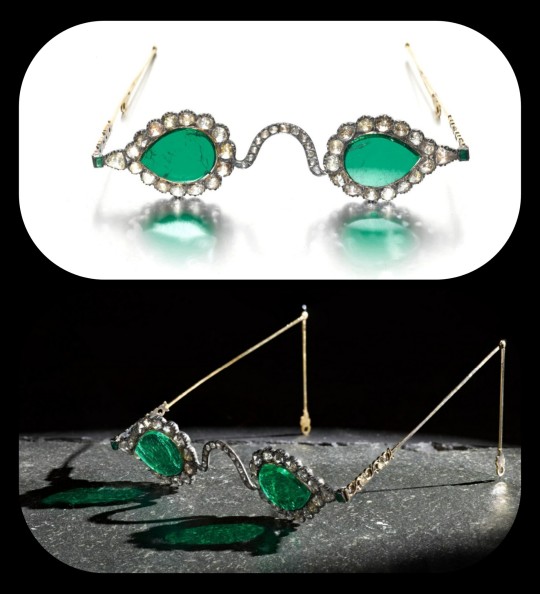
These eyeglasses are also known by the name "Astaneh-e ferdaws," meaning "Gate of Paradise," based on the perception of the color green as a symbol for spiritual salvation/Paradise. This was a common belief in Mughal-era India, where the spectacles were made.
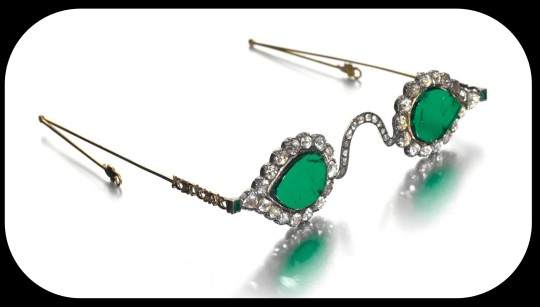
The lenses were crafted from two thin slices of the same emerald. Together, the lenses have a combined weight of about 27 carats, but given the precision, size, and shape of each lens, experts believe that the original emerald likely weighed in excess of 300 carats (more than sixty grams) before it was cleaved down in order to produce the lenses. The emerald was sourced from a mine in Muzo, Colombia, and it was then transported across the Atlantic by Spanish or Portuguese merchants.
Each lens is encircled by a series of rose-cut diamonds, which run along an ornate frame made of gold and silver. The diamond-studded frame was added in the 1890s, when the original prince-nez design was fitted with more modern frames.
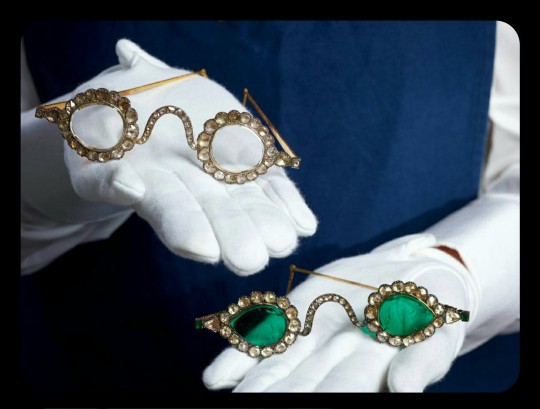
The emerald eyeglasses have long been paired with a second set of spectacles, and they were almost certainly commissioned by the same patron. This second pair is known as Halqeh-e nur, or the "Halo of Light."
The Halo of Light features lenses that were made from slices of diamond. The diamond lenses were cleaved from a single stone, just like the emerald lenses, with the diamond itself being sourced from a mine in Southern India. It's estimated that the original, uncut diamond would have weighed about 200-300 carats, which would make it one of the largest uncut diamonds ever found.
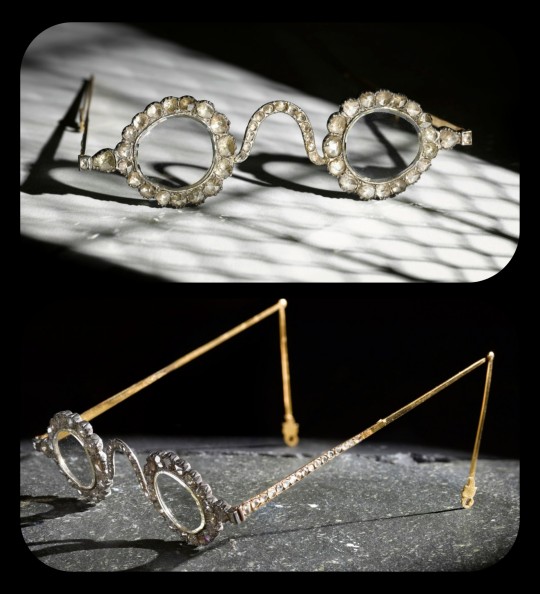
These lenses are so clear and so smoothly cut that it sometimes looks like they're not even there
Both sets of spectacles date back to the mid-1600s, and it's generally believed that they were commissioned by a Mughal emperor or prince. The identity of that person is still a bit of a mystery, but it has been widely speculated that the patron was Shah Jahan -- the Mughal ruler who famously commissioned the Taj Mahal after the death of his wife, Mumtaz Mahal. Shah Jahan did rule as the Mughal emperor from about 1628 to 1658.
The emerald and diamond lenses may have been chosen for symbolic/cultural reasons, or they may have been chosen simply because they're pretty and extravagant; their meaning/purpose is unclear. Experts do believe that the eyeglasses were designed to be worn by someone, though.
It was believed that the spectacles had spiritual properties, like the ability to promote healing, ward off evil, impart wisdom, and bring the wearer closer to enlightenment. Those beliefs are often related to Indic and Islamic traditions, some of which ascribe spiritual and/or symbolic traits to emeralds and diamonds. Emeralds can be viewed as an emblem of Paradise, divine salvation, healing, cleansing, and eternal life; diamonds are similarly associated with enlightenment, wisdom, celestial light, and mysticism.
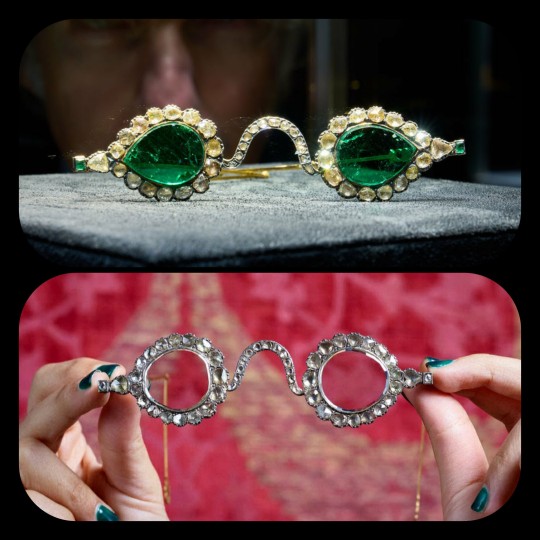
The Gate of Paradise and the Halo of Light were both kept in the collections of a wealthy Indian family until 1980, when they were sold to private collectors, before going on auction once again back in 2021. They were valued at about $2 million to $3.4 million per pair.
Sources & More Info:
Sotheby's: Mughal Spectacles
Architectural Digest of India: At Sotheby's auction, Mughal-era eyeglasses made of diamond and emerald create a stir
Only Natural Diamonds: Auspicious Sight & the Halqeh-e Nur Spectacles
The Royal Society Publishing: Cleaving the Halqeh-Ye Nur Diamonds
Gemological Institution of America: Two Antique Mughal Spectacles with Gemstone Lenses
Manuscript: From Satan's Crown to the Holy Grail: emeralds in myth, magic, and history
CNN: The $3.5 million Spectacles Said to Ward off Evil
BBC: Rare Mughal Era Spectacles to be Auctioned by Sotheby's
#history#archaeology#artifact#mughal#india#17th century#art#emerald#diamond#glasses#indian lore#islam#religion#mysticism#indian history#anthropology#spirituality#fashion
4K notes
·
View notes
Text
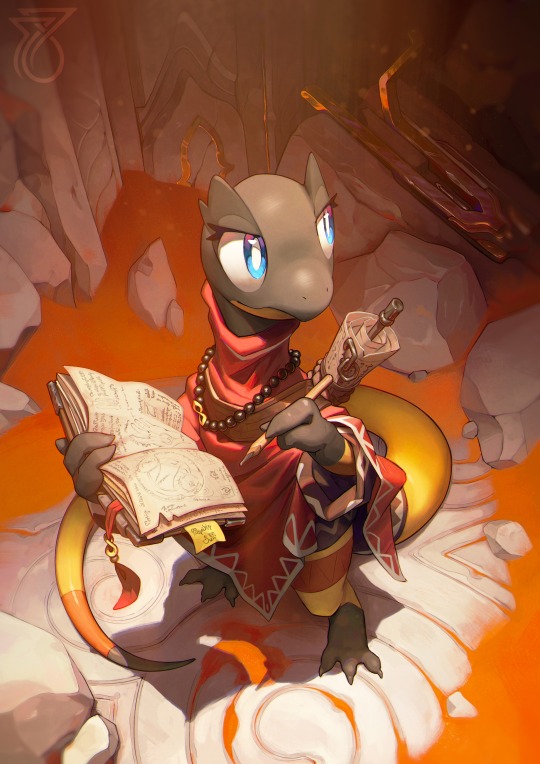
Across the sprawling tapestry of our world, amidst the flat lands and forests, the mountains' solemn peaks, the rugged coasts, sprawling dunes and the silent depths of cavernous earth, there stand monuments of enigmatic grandeur. Reminders of a time forgotten, there lie scattered remnants of the bygone Age of Wonders, veiled in mystery and cloaked in the hushed secrets of heresy.
These ruins, wrought of ethereal white stone intertwined with veins of golden and silver, stand as solemn sentinels to an era lost. Their works speak of skill and power beyond our reckoning, a testament to the ingenuity of minds now forever stilled.
Tales among the learned speak of a people long vanished, a race of ancients known as the Nairim. Once, they walked beneath the god's golden light, their footsteps echoing through the halls of time, the wonders of their creation inspiring fairy tales of fools. Yet, lust for grandeur and folly marked their days, and they dared to defy the gods themselves, their ambition a flame that consumed them til their race was destroyed and their last bones became dust.
They stand as a warning, a cautionary tale of betrail enshrined in words and tongue. To admire the ruins of the Nairim is to court the ire of powers long dormant, to stir the embers of forgotten evil. Thus the voices of the wise counsel against delving too deeply, against unravelling the threads of a past best left undisturbed and buried.
Let the ruins of the Nairim, these Humans, stand as silent witnesses to the folly of their hubris, as testament to the fragility of mortal pride. Let them stand, and let us heed the lessons they impart, lest we too be consumed by the flames of our own hubris and the thoughts of heretical darkness.
Thalas the historian, History of the White Towers - Introduction to the Old Cultures of the Continent of Sands
Fourth Age
#fantasy#art#pokemon#pokemon mystery dungeon#fantasy art#digital art#character#kritaart#pmd#heliolisk#ruins#ancient ruins
761 notes
·
View notes
Text
burn your life down | chef luca x fem!reader | chapter one
summary: leaving your old life behind, you move to copenhagen to follow your dream of opening a restaurant. almost a year after opening, luca's quest for inspiration brings him right to your doorstep.
warnings: fluff, eventual smut, eventual angst not use of y/n, second person pov, swearing, danish inaccuracies, very little connection to the world of the bear.
word count: 2500
a/n: remember when i said we'd get pastry chef luca fanfic whether we liked it or not? well, it seems i can't be normal about anything bc i have an outline of (potentially) 10 chapters right now based on this headcanon. while i try to keep reader characters pretty neutral so that you can picture yourself, i have this reader creating food from her own life experiences/cultures so do what you will with that. also, i tagged some peeps from my headcanon post, but please let me know if you'd like to be removed.
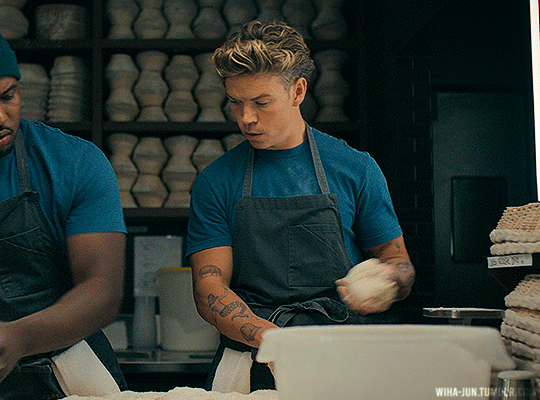
masterlist | part two
He’s in search of inspiration when he finds the restaurant – your restaurant.
It’s an American stagiaire and a single conversation that makes him realize that he’s missing something – that he’s been in need of something fresh, a new perspective– setting him on his quest.
The best things are inspired.
Luca stares at a blank piece of paper for what feels like hours, writing a few things down, sketching up an idea, before viciously crossing them out, hopelessly stuck on new ideas for the new menu. After a few half-baked ideas that go nowhere, It occurs to him that he may be in need of a little inspiration himself. He can’t think of the last time he’s taken his own advice, mulling over the carefully-chosen words of wisdom imparted to Marcus a couple of weeks ago, and he’s determined to change that.
A review in the paper, an old colleague’s recent trip there, and a glowing recommendation from a close friend are what bring him to the restaurant.
He’s not sure what to expect – having forgone any interest in cuisine described with the words trendy or fusion a long time ago – but Luca reminds himself that it’s the writer’s word choice, not the chef’s, when writing the article.
When Luca steps into the small home-turned-restaurant, he’s immediately inundated with a warmth, a homeyness, that takes him by surprise. From the open kitchen, to the golden lighting, it feels vastly different from the classic Danish-style, fine dining establishments that have swept the country.
But Luca reminds himself that the announcement of noma’s 2024 closure, has shifted the conversation around dining culture in Denmark, and already, he can feel that this is the breath of fresh air that he’s been looking for.
Luca’s seated quickly with care and hospitality by a highly-attentive host, which he only assumes is a symptom of the fact that he read somewhere that you’re an American. While Danish, the host is boisterous, as if he’s known Luca since childhood. Luca smiles politely in response, graciously thanking the man and his chocolate brown curls.
The menu is small, indicating that each dish receives enough care to be excellent and he likes that, despite being described as trendy and fusion-focused, your menu is creative. It’s different. It’s inspired.
He chooses the special of the day: the mapo tofu bolognese – a traditionally Italian concept done from an Asian perspective – and the suggested wine pairing.
It doesn’t take long for him to receive his glass of wine, or his food, and he’s pleasantly surprised by how efficient service seems. Stealing glances through the open kitchen, he watches as you and your sous lead dinner service with a kind of compassionate leadership and playfulness that warms him from the inside out.
“We recommend mixing the whipped tofu into the dish for a creamier sauce. Skal,” his waitress greets, with a warm smile on her face as she sets down the bowl of noodles.
“Cheers,” Luca replies, his eyes savoring every single detail of the dish.
It’s somehow elevated, thoughtful, and elegant, yet comforting all at once.
Luca picks up his fork, using it to collect a little bit of everything – a perfect noodle twirl with just enough sauce, and ground pork before running his fork the whipped topping – raising the fork to his lips for his first bite.
As the flavors hit his tongue, he closes his eyes, and it’s as if time has stopped, just for a moment.
The wheat noodles are perfectly al dente while the whipped tofu is almost ricotta-like, transforming into a silky smooth addition to the dish, cutting the tingle and heat of the Sichuan chili peppercorn-based sauce.
The corners of his lips turn up as he takes a breath, opening his eyes as he savors the delicate layers of flavors. With a crooked smile on his face, he decides that he’ll most certainly be back next week.
-------------------------------
You make peace with the fact that tonight is one of those nights – a slow night – as you finish washing your hands. It being a slow night, you’d encouraged your staff to up the hospitality at the pre-shift meeting. Treating guests with the utmost personal touches in an effort to build genuine connections would be the focus of tonight’s slow service. In fact, you and Mathilde, your sous chef, had been running dishes out this evening – something you rarely had the luxury to do.
“You should go say hello,” your sous encourages, nodding towards the dining room through the expansive window of the open kitchen.
“Thought it was your turn,” you reply in a casual tone, paying no attention to who she’s referencing.
“No, I think you should take this one,” Mathilde nudges you, causing you to look up. You shoot her a funny look, your eyes flickering over the mischievous expression she has on her face, to where she’s gestured towards.
“To-?” you begin to ask, before seeing exactly who she’s talking about.
“Ehm. Tall, blonde, and tatted!” she emphasizes in a whisper yell.
You don’t really need the description as you glance over at the dining room, easily spotting the man seated at a two-seater near the front window.
“You’re right. He’s become a bit of a regular,” you agree with a curt nod that means all business, no pleasure, as you move a few things as you walk and talk around the kitchen, tidying up.
“That’s not what I meant,” she scoffs with a playful eye roll.
“You know, Jesper thought he was Swedish because… look at him… but he’s apparently a Brit,” she gossips with you, her eyes stealing a glance his way. “We’re slow tonight. He’s here every week. Sure he’d appreciate a direct thank you from the chef!”
“I-,” you hesitate, wondering why she’s so damn insistent on this. “... yeah, alright. I’ll go.”
“That’s my girl!” Mathilde cheers, in a sing-song voice, she hands you the beautifully plated bowl of pasta to take out to the dining room.
As you walk over towards his table, you make a note that it seems as if the mystery man has made this a bit of a routine. He shows every Saturday at exactly 7 pm, week after week, for the past month or so, as if it’s a standing date he has with himself. After his first visit, you half-expected him to bring a date when he returned, or bring a group of friends, or for something different to happen.
But it hadn’t and you’ve watched him come in, week after week, with a different book each time. He always orders the special of the day and whatever suggested wine pairing Jesper’s recommended that week.
Most Saturday nights you're busy leading a kitchen or cooking on the line – having little to no time to fixate or wonder curiously over your weekly diner – but tonight’s pace affords you the luxury to spend more time at the front of house. Truthfully, you know it’s the thing that sets you apart. Sure, the hospitality here in Copenhagen is excellent, but you bring an American hospitality-style to this restaurant – and above and beyond mentality – that feels welcoming, personal, even, as if your restaurant itself is just an extension of your home.
You’ve heard your staff – front of house and back of house – whispering about him, all seemingly enamored and enchanted by the charming Brit. All any of you knew about him was that his name was Luca and that he’s always more than kind to your front of house staff.
He doesn’t say much when he comes in, you’ve noticed, but every Saturday at 7 pm, he’s pushing his way through the front door with punctuality and a gentle ease.
The whisperings from your staff had all revolved around who your mysterious regular must be: whether he was Danish or Swedish, that someone that good looking must already have a partner, that he doesn’t wear a ring.
You hadn’t paid much attention to the gossip (or at least that’s what you’ve told yourself) more focused on running dinner service then trying to piece together the story of your handsome, mysterious regular.
“Hello,” you greet him warmly. “I just wanted to come introduce myself and say thank you for becoming one of our regulars. Your support means a lot to all of us.”
“Hi, I’m Luca.”
You share your name with a smile as he shakes your hand.
Luca turns his attention down to the bowl you’ve put in front of him, his eyes taking in the beautiful presentation hungrily.
“Wow, this looks… incredible,” he marvels, returning his gaze back to you.
“Thank you. I’m sure my front of house already walked you through this but if you’d like for me to-,” you begin.
“Yes, that’d be great, thanks,” he interjects, a crooked smile on his face that makes your heart skip a beat.
You have to pull your attention away from him, hoping he doesn’t notice that you’re quite possibly gawking at him.
He’s kind, charming, and he’s easy on the eyes (easy on the eyes, really being an understatement here).
“Today’s special was inspired by a childhood favorite of mine,” you begin, walking him through each component of the dish.
Crispy Rice. Caramelized marinated trumpet mushrooms and charred broccolini. Your mom’s sauce approached with classic French techniques, courtesy of your sous, Mathilde, a classically French-trained chef.
It’s a marriage of your story. Of the people around you. It’s your heart and theirs, put into a dish.
“You’re the chef?” he asks, unable to hide the surprise in his voice.
“Yes,” you answer, trying your best to get a read on him.
He balks, and you’re unsure of how you’re supposed to respond. Was he surprised that you’re a woman? That he’s been eating your food the whole time and expected a male chef? Before you can overthink it, Luca clarifies with:
“I’m sorry. It’s just-, I can't think of the last time I saw a head chef work front of house, let alone with this much care.”
Oh.
You let down your guard, wondering why you’d assumed the worst when the man’s been nothing but kind to you and your staff so far.
"We're a little short staffed tonight. And I love getting to talk to diners… especially on nights like this,” you explain, trying your best to sound like you hadn’t just assumed that he was a sexist asshole.
He shakes his head in disbelief, looking down at the picturesque bowl, then back to you.
Luca is impressed, and he has no intention of hiding it.
He picks up his wine glass by the stem, raising it to you.
"Cheers,” he says. “And thank you. This is a really beautiful dish.”
“Of course. Enjoy,” you reply, giving him a polite smile, before heading back into the kitchen.
-------------------------------
“Good service tonight, everybody!” Jesper, your front of house manager, announces while clapping a few times to signal to staff that it’s time for a post shift meeting.
As you all gather in the pristine front of house space. Some of your cooks have taken their aprons off, others haven’t had a moment to unwind from the shift yet – business picking up in the last hour or so of service.
Jesper goes through his nightly wrap-up notes, celebrating the wins of tonight, and making sure to celebrate how everyone rallied to pick up pace when business spiked. He’s gregarious, larger-than-life, the kind of person who can talk to anyone about anything, making him an excellent front of house manager, and even better sommelier. You really lucked out with the twins, you think to yourself – with Jesper and Mathilde – when they were more than eager to work with you on opening this restaurant.
“Oh, and before we go, a client left a gift… table number four,” Jesper says, in reference to Luca’s table. He pulls a tan-colored pastry box from another table, setting it down on a table where everyone can take a look.
“As a thank you. He requested for me to share. So have it and let’s make a note next time he’s in to really treat him like a VIP.”
One of your most-talented servers opens the box, eliciting a chorus of gasps, giggles, and excited whispers as soon as the assortment of croissants and pastries are revealed.
You and Mathilde exchange a look as everyone else busy themselves with unpacking the pastry box. Mathilde raises an eyebrow and you’re not sure what to say. Witnessing your silent exchange, Jesper makes his way over to the both of you, before extending his arm to reveal the card he’s holding.
“And this, my dear…” he begins, exchanging a look with his sister. “...is for you.”
“What do you-, just me?” you ask as you take it, hesitantly.
“I think so, yeah,” he nods, confidently.
To the Chef, the front of the card reads.
“Jesper, let’s check out some of these pastries, yeah?” Mathilde suggests, not so subtly hinting towards her brother.
He nods, giving you a little space so that you can read the card Luca’s left for you.
As your staff divvy up the box of laminated pastries, sighing with joy as they taste the decadent, hand-crafted sweets, you take a few steps away to open the note. His handwriting is pristine – perfectly neat in every way, like he’s written over carefully measured invisible lines.
Chef,
Thank you for all of the great meals. I'd like to return the favor, that is, if you're open to it.
Tomorrow. 5 pm. Dronningens Tværgade 2, 1302
While Luca’s gift has been more-than-generous, you find yourself overwhelmed by questions. Was he a chef too? And why had he not said anything? And what was this gesture all about anyways?
You read the card a few more times, turning the words over in your head as you try to make sense of it.
Mathilde can see your overwhelm, your eyebrows knitted into one confused expression as she saunters back over to you.
“What does it say?” she asks, curiously. “A love confession perhaps?”
“Mathilde, you really have to stop reading all of those French romance novels!” you tease her. “It’s giving you too many ideas.”
“It’s the only way I keep up with my French!” she defends herself with a lackadaisical shrug, earning a laugh from you.
“Uh no… it’s actually a thank you card… only I think he… wants to feed me,” you share with her, holding the card out so that she can take a look.
“He’s a chef too?” she asks, taking the card from your hands.
“I think so, yeah,” you reply, letting out an exasperated laugh.
“Oh shit!” Mathilde exclaims, as soon as she sees the address that Luca’s written down.
“What?” you ask her, wondering if there’s something you missed.
“The address… that’s AOC. I think he’s a chef at AOC, babe,” she gasps, shaking her head as she hands the card back to you, sending a ‘you lucky, bitch’ look your way.
Oh shit, is right.
#chef luca#will poulter#luca the bear#the bear season 2#the bear headcanon#luca x reader#the bear hulu#the bear fx#the bear fanfiction#chef luca x reader#pastry chef luca#burn your life down
1K notes
·
View notes
Text
打鐵花 (da2tie3hua1; struck iron fireworks) is a traditional folk firework that began in Henan and Shanxi, first arising in Queshan county, Henan and later circulating through the whole country. It had first appeared during the Northern Song dynasty, and was most popular during the Ming and Qing dynasties.
For Queshan struck iron fireworks, a two-layer pergola is built and covered with willow branches for performances, under which the molten iron is struck up with two willow sticks to create a rain of fire.
[eng by me + edited an ad out]
(On top of the information in the video, I have some more about its recent history under the cut.)
*Also, a note about one of the subtitles: I realized later that "going into battle without a shield" actually just meant going shirtless. I was only confused about this phrasing while translating because she didn't go shirtless, although that is for obvious reasons
Queshan struck iron fireworks had almost been lost before Yang Jianjun unearthed it again in 1988. It had almost died out in the early years of the Republic of China being established, after which there had only been three performances until 1988: 1952, 1956, 1962. Yang Jianjun had seen the 1956 performance as a 7-8 year old and later on as the director of a cultural centre, began digging up the skill and its history. In the process, he became an apprentice to Li Wanfa, who had been the last head of the Queshan Struck Iron Fireworks Society. He practised with sand and water, learning of its historical origin, its ancestral inheritors, craftsmanship and performance arts, but didn't touch the real thing until 1988. Through Yang Jianjun's efforts and investment, the first struck iron fireworks performance in more than 25 years took place in Nanshan Square (then a deserted area) in Queshan county.
Queshan struck iron fireworks are different from other struck iron fireworks in that it requires a wide area to perform, whereas others only needed a wall or could be hit straight up into the air, and it costs much more money to set up.
The names of inheritors are difficult to trace, and can only be traced back to the Qing dynasty during the Qianlong period, making Yang Jianjun a sixth-generation inheritor, and Jiang Xunqian (OP) the first woman and a seventh-generation inheritor.
#douyin#arts#imparting culture#struck iron fireworks#creator: 江寻千(九月)#personal fav#i spent wayyyy too much time on this#def the most time i've ever spent on a post#i'm v v excited to post this#also i originally tl'd 打铁花 as blacksmith's fireworks and then i realised that wouldn't work
8K notes
·
View notes
Text
🌟 The Radiance of the Sun in Different Houses 1-12
Astrological observations, while insightful, may not resonate universally, considering the multifaceted nature of celestial influences.
Sun in the 1st House 🌞
Individuals with the Sun in the 1st House often project a Leo Rising aura, radiating optimism. Their life's essence revolves around self-expression, creativity, and inspiration. While exuding confidence, they may verge on narcissism. Dressing impeccably, they project an unwavering self-assuredness, occasionally bordering on overconfidence. These personalities perceive themselves as protagonists, subtly guiding others according to their convictions.
Sun in the 2nd House 💰
In the 2nd House, the Sun endows individuals with a sense of self derived from financial pursuits and possessions. This placement kindles a love for art and a refined aesthetic. Their material confidence and self-worth manifest through an elegant demeanor. The 2nd House sunbearers may exude possessiveness and control. Notably, their voices often carry authority, and they may harbor a penchant for glorifying family history, irrespective of its nature.
Sun in the 3rd House 🗣️
For those with the Sun in the 3rd House, communication is key to self-identity. These chatter virtuosos thrive on expanding their intellect and knowledge. Trendsetters and courageous thinkers, they might encounter challenges in sibling relationships but excel in journalistic, writing, or influential roles.
Sun in the 4th House 🏡
Sun in the 4th House cultivates a secretive homebody persona. Drawing self-worth from home, family, and close friends, these individuals are adept at creating an aesthetic haven. Guarded and protective, they resist intrusion into their personal space. Early life struggles shape their creativity, with maternal influence being pivotal. A culinary inclination is also noteworthy.
Sun in the 5th House 🎭
Creative exuberance defines the Sun in the 5th House individuals. Expressing themselves becomes a source of self-identity, often with a touch of showmanship. Social butterflies and history enthusiasts, they effortlessly combine academic excellence with entertainment. Parenting becomes a profound aspect of their self-concept.
Sun in the 6th House 🌿
Health-conscious and routine-driven, those with the Sun in the 6th House derive self-identity from work and daily regimen. Workaholics with meticulous habits, they maintain good health and often pursue careers in service-oriented professions. Resolving conflicts and helping others are innate qualities, occasionally leading to friendly competition.
Sun in the 7th House 👫
Individuals with the Sun in the 7th House seek self-identity through relationships. Friendship and partnerships magnify their existence, albeit with a tendency towards dependency. External validation and projected insecurities may complicate their dating life.
Sun in the 8th House 🔮
The enigmatic Sun in the 8th House exudes magnetic allure, drawing others like obsessive fans. Veiled in secrecy, they navigate life's transformations with finesse. Occult interests and a love-hate dynamic characterize these individuals. Career paths may involve politics, research, or the paranormal.
Sun in the 9th House 🌐
Influenced by paternal relationships, the Sun in the 9th House imparts righteousness and a disdain for confinement. Adhering to principles, they resist being pigeonholed, seeking expansive experiences. Travel and exposure to diverse cultures may shape their lives, occasionally leading to perceptions of being a "know-it-all."
Sun in the 10th House 🌟
A coveted placement, the Sun in the 10th House signifies popularity and leadership. Revered by many, these individuals eschew subservience and thrive on independence. Potential clashes with authority figures stem from their innate leadership qualities. They effortlessly influence groups, embodying trendsetting charisma.
Sun in the 11th House 🌐
Ego-driven and challenging, the Sun in the 11th House signifies a struggle with friendships and authority. Dreams and ambitions drive them forward, even as relationships with family and friends undergo strains. Material wealth and longevity become consequential.
Sun in the 12th House 🎭
The Sun in the 12th House bestows creativity and imagination, often hidden beneath a shroud of secrecy. A potential source of conflict with the father figure, this placement fosters a proclivity for foreign settlement. Hidden talents and a nomadic existence characterize their lives, contributing to a unique talent for creative pursuits.
Thanks for reading! Please like, reblog, comment! <3
#astro notes#vedic astrology#sun in 10th house#sun in houses#sun in astrology#sun aspects#sun astrology#western astrology#astroblr#astro community#astro placements#sun in 8th house#sun in 2nd house#sun in 3rd house#sun in 4th house#sun in 5th house#sun in 6th house#sun in 7th house#sun in 9th house#sun in 11th house#sun in 12th house#tarotwithavi#astrology#pluto astrology#saturn astrology#venus astrology#sun in 1st house#astrology facts#astrology observations#astrology houses
461 notes
·
View notes
Text
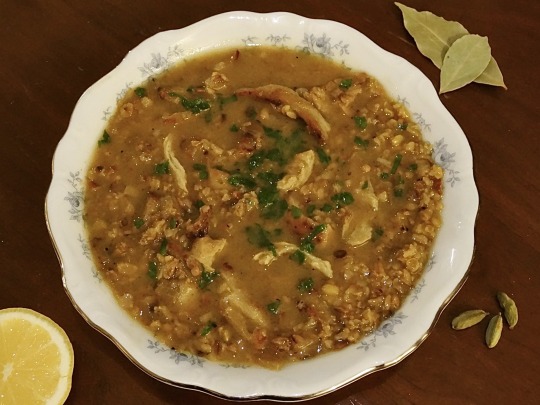
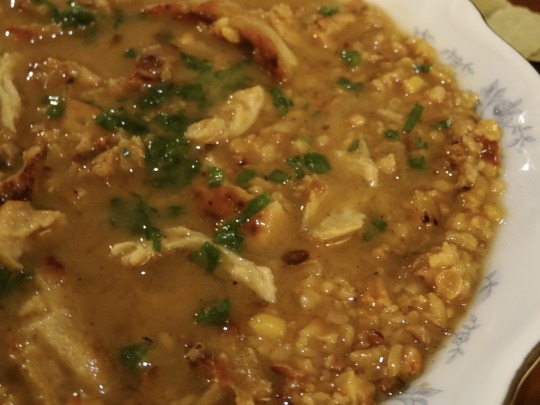
[ID: A greenish-brown soup with an herb garnish in a bowl surrounded by a halved lemon, green cardamom pods, and bay leaves, followed by a close-up of the same soup. End ID]
شوربة الفريكة / Shorabat al-frika (Green wheat soup)
Frika (فَرِيكَة or فَرِيك; also transliterated "freekeh," "frikeh," or "farik") is durum wheat harvested in the early spring, while the grain is green, unripe, and tender. Durum wheat, or semolina, is a different species of wheat than that which is ground to produce all-purpose flour (common wheat, or bread wheat); it is used to make couscous (كُسْكُس), bulghur (بلغور), and many types of pasta, and is widely consumed in North Africa, the Levant, and the Arabian peninsula. After harvest, unripe durum is sun-dried and then set ablaze in piles to burn off the straw and leave just the heads of wheat, resulting in a nutty, smoky flavor; the heads are then vigorously rubbed, traditionally by hand, to remove the bran. Frika is named after this last process; the word comes from the verb "فَرَكَ" "faraka," "to rub."
A staple in Palestine, shorabat al-frika (with diacritics, Levantine pronunciation: شُورَبَة الفْرِيكَة) is often eaten as an appetizer with the fast-breaking meal during Ramadan. It may contain nothing more than an onion, olive oil, frika, and water, but sometimes contains meat (usually chicken, but also beef or lamb), green chili peppers, and spices including cardamom, black pepper, bay leaves, turmeric, cumin, and seb'a baharat; some people today like to add chickpeas. Shorabat al-frika is often prepared with the chicken broth obtained by boiling chicken to make musakhkhan (مُسَخَّن), and served alongside it. It is a warming, filling, and earthy soup, with a complexity of flavor imparted by the frika itself: a fresh tartness due to the unripe grain, and a roasted aroma due to its harvesting process.
Shorabat al-frika is in keeping with a Palestinian food ethos of using simple, local ingredients to their fullest potential. Frika itself is sometimes thought to symbolize adaptability and resilience, as it was often eaten in times of scarcity when other crops were not yet ready to be harvested. Legend holds that it was discovered in a time of similar necessity: when villagers in the eastern Mediterannean tried to salvage a field of wheat that had been burned by ambushing soldiers, they found that the grain was still edible beneath the blackened chaff, having been saved from the fire by its moisture.
Frika, due to its centuries as a staple in Palestine, has also come to symbolize acceptance, Palestinian history, and connection to the land and community. In the Palestinian diaspora and amongst internally displaced people in Palestine, food is conceived of as a form of connection to homeland across distance; continuing to make Palestinian food, and remembering or using baladi ("native," "from my country") varieties of grains, produce, and herbs, is a link to the land and an expression of the hope to return.
By the same token, though, frika has come to represent Palestinian displacement and "cultural obliteration," per Rana Abdulla. One of the ways in which Israel rhetorically justifies its existence is by claiming sole ownership of an old, organically arising culture rooted in the land: the easiest way to do this is, of course, to rebrand what was already there. Food connects and combines language (in terminology and pronunciation), culture, history, climate, and land into one web of discourses, and is therefore a prime site for colonial myth-making and ideological nation-building. Thus a construction such as "Israeli freekeh" is, in fact, an intensely political one.
Nevertheless, frika continues its life as a symbol of connection, community, and resistance during adversity in Palestine. Nasser Abufarha, of the Palestine Fair Trade Association, noted in 2015 that more and more Palestinians across the West Bank were harvesting some of their wheat early to make frika, rather than relying on cheaper, imported rice. As of October 23 2023, and in defiance of an Israeli air raid which destroyed their kitchen in 2014, Jamil Abu Assi and his cousins were using frika, alongside lentils and rice, as staples in distributing food to thousands of refugees per day in Bani Suhaila, near Khan Younis. Others in the community donated ingredients or volunteered to distribute meals.
Support Palestinian resistance by contributing to Palestine Action's bail fund or to Palestine Legal's defence fund, or by attending court or making a sign to support the Elbit Eight.
Ingredients:
1 cup (170g) frika baladia (فريكة بلدية), Levantine frika
4 cups water, or vegetarian chicken stock from concentrate
1 large yellow onion, chopped
1/4 cup extra virgin olive oil
1 green chili pepper (فلفل أخضر حار), sliced (optional)
1/2 tsp ground black pepper (فلفل اسود)
5 cardamom pods (حب هال)
2 Mediterannean bay leaves (ورق غار)
250g chicken (or beef) substitute, torn or cubed (optional)
Salt, to taste
Parsley, to garnish
Halved lemon, to serve (optional)
I have kept the spices relatively simple, as most cooks do, to highlight the earthy end of the taste spectrum and to allow the flavor of the frika itself to come forward. Most people add at least cardamom and black pepper; many add bay leaves to this duo; turmeric is the next most common addition I have come across. I have seen a few people add cumin, coriander, or allspice.
Frika can be found in the grains section of your local halal grocery store (labelled "فريكة", “فريك" "freekeh" or "frikeh"). Look for something that specifies “roasted.”
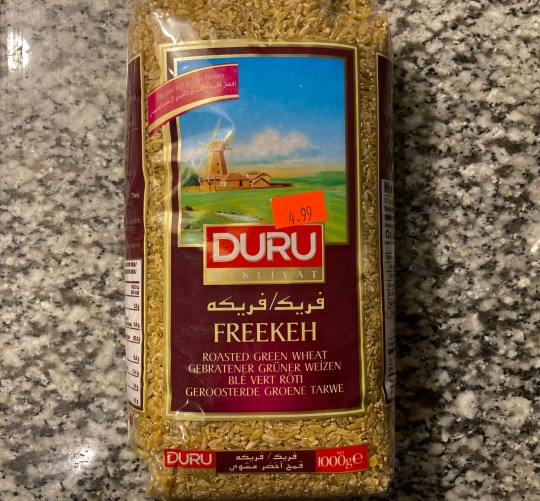
You may also be able to find frika at a speciality or health foods grocery store, but it might not have been fire-roasted as it is in the Levant. If your frika doesn't smell toasty, try roasting it in a dry pan on medium-heat for a few minutes until fragrant.
Frika may be found whole, cracked, or fine (نَاعِمَة / na'ima). You may use any kind for this soup; most people use cracked or fine frika, because of its shorter cooking time. You can pulse whole frika a few times in a food processor or spice mill, until coarsely ground, if you prefer a fine texture but can't find fine frika.
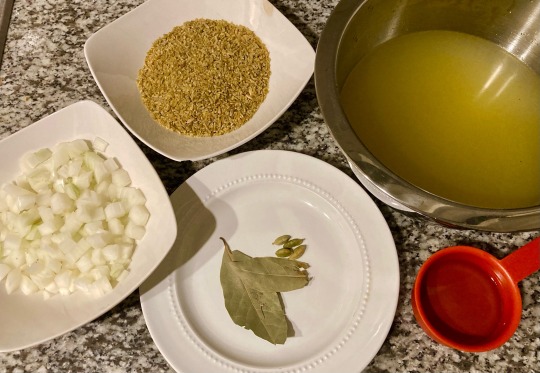
Instructions:
1. Heat olive oil in a large pot on medium. Add onion, a pinch of salt, cardamom pods, and bay leaves and fry, stirring occasionally, until the onion is golden brown.
2. Add the chili pepper and cook briefly until softened.
3. Add frika and black pepper and roast, stirring occasionally, for a few minutes until fragrant.
4. Add the water or stock and stir to combine. Bring to a fast simmer and cook, covered, about 50 minutes for whole frika and 20 minutes for ground, until fully cooked. Add additional water as necessary. The frika will still be chewy at the end of the cooking time.
5. Fry meat substitute of your choice in olive oil with salt, black pepper, and a optionally a pinch of Palestinian seven-spice, until browned. Add to soup and stir to combine. Taste the soup and add salt and more black pepper, if necessary.
6. Garnish with whole or chopped parsley and serve warm.
The meat is usually added to this soup just after the onions, and simmered along with the frika. You can do it this way if you like, but I have never found simmering to do the texture of meat substitutes any favors.
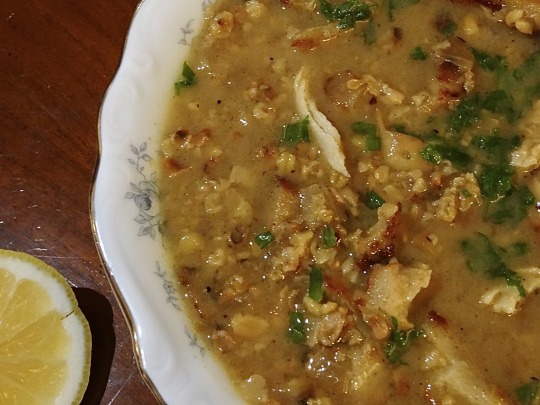
492 notes
·
View notes
Text
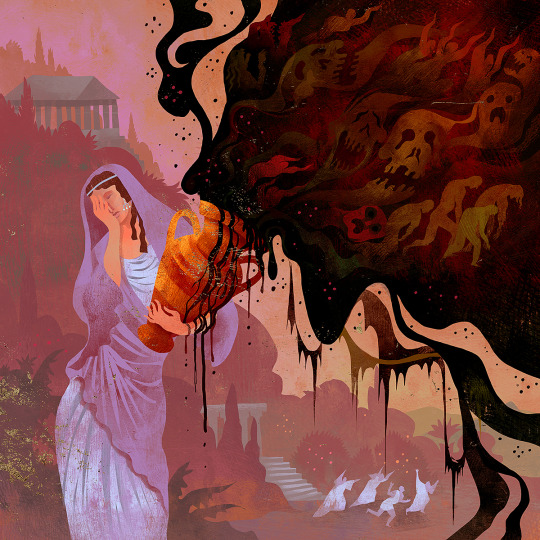
The punishment of Pandora's jar illustrated by me
Seeking retribution for being betrayed by prometheus, Zeus forms a cunning punishment for humanity. He orders ingenious Hephaestus to mix water and soil to form a maiden: Pandora, the first woman of the mortal race. The olympians impart gifts and attributes into her. From Athena, the skill of needlework and weaving, Aphrodite; “cruel longing and dares that weary the limbs.” Hermes; …”a shameless mind and deceitful nature.” Athena clothes her in a “silvery rainment” and an “embroidered veil,” the Charities offer necklaces of gold, and the Horai crown her head with spring flowers. Hephaestus forges a crown of gold for her head.
Zeus then orders Hermes to deliver Pandora carrying a jar as a wedding gift to Prometheus’ brother, Epimetheus, (who had already been warned by Prometheus never to accept gifts from Zeus.) But bewitched by her beauty and splendor, Epimetheus accepts. But Pandora’s curiosity gets the better of her and she opens the jar, releasing ills, toil, sickness, sorrow, and mischief into the world of humankind. She covers the jar before the final trait can escape: Hope. So it thus remains for mortals to use.
On one hand, this tale can certainly be a reflection of misogyny from a patriarchal society. On the other hand, this simplistic and sexist view clearly wasn’t universally reflected amongst all greek cultures and mythic literature, with the creation of powerful female heroines like Atalanta and Penthisilea who exercise real agency in their destinies, or goddesses like the mother goddess of Ephesian Artemis in Anatolia, or the war-like Aphrodite Areia of Sparta. Even more nuanced are the vengeful female antiheroes like Cyltemnestra or Medea, who lash back at the patriarchal suppression they face.
Like this art? It will be in my illustrated book coming in October 🤟❤️🏛 check my top 2 links in my linktree in my bio to join my newsletter for updates and to join the kickstarter notification page.
What do you think about hesiods portrayal of pandora in his tale?
Support my book kickstarter "Lockett Illustrated: Greek Gods and Heroes" coming in early 2024.
#pagan#hellenism#greek mythology#tagamemnon#mythology tag#percyjackson#dark academia#greek#greekmyths#classical literature#percy jackon and the olympians#pjo#homer#iliad#classics#mythologyart#art#artists on tumblr#odyssey#literature#ancientworld#ancienthistory#ancient civilizations#ancientgreece#olympians#greekgods#agamemnon#troy#trojanwar
345 notes
·
View notes
Text
So I’ve been thinking about cultural Christianity lately and how people tend to get very upset about it without really understanding what it is, so here is a primer
Cultural Christianity is not a choice you make. It does not mean you are Christian, or even that you remotely like Christianity; a lot of people who vehemently hate the religion do so because of their own cultural Christianity
It is not a shortcoming, or a moral failing, or a sin. It just means that the culture you were raised in was predominantly Christian.
Note: I did not say “majority Christian”. Christians don’t need to be a majority to have a dominant cultural influence
Cultural Christianity means you inherently understand and probably use swearwords like “damn”, “hell”, or a variation on the name “Jesus Christ”
It means when I say cultural Christianity is not a sin, you understand exactly what I mean without needing to have it explained - and you probably know the phrase “original sin” or “seven deadly sins”, even if not in full detail
It means hearing about Hades, god of the dead, wealth, and volcanoes, and assuming he’s the bad guy of Greek mythology… y’know, like Satan
(EVERYONE went to Hades when they died. The Elysian Fields, where the best heroes went, was in Hades’ underworld. The Eleusinian mysteries, a cult to Demeter and Persephone, was basically about asking them to tell Hades to give you a cool afterlife
And he would cuz he drank his “respect wife” juice if not all of his “respect women” juice. Did still kidnap her. But she is a major feature and often makes the decision herself or influences his when they’re mentioned together
Meanwhile, people try and cast Zeus as a good parent)
It means having to have a dreidel, a menorah, or a kinara explained to you at a time when you already knew about Christmas trees and Santa
(Yes, Santa Claus, Saint Nicholas, major host of the Mass of Christ, is culturally Christian. Even though Coke invented his aesthetic - that’s the “cultural” part)
It’s when you go to make up a new non-religious or pan religious winter celebration… that is centred around a day with family and gifts which is obviously the 25 of December. Maybe counting down 12 days before
It’s defaulting to calling a place of worship you don’t know the name of a “church”
Cultural Christianity is not something people have a choice in; you don’t pick where you’re born, and there are so many other cultures in places like Canada, America, and Britain that are culturally Christian out the ass! But… you will catch Contact Christianity in any of these places
It’s damn near impossible to consume any American or most Western media without brushing across it; cross imagery is everywhere, Christian demons and devils sneak into media all around the world
Western (and some other) Gothic fashion leans heavily on gothic architecture and, yeah, heavily Catholic imagery
Now, brushing across the media in other parts of the world does not impart the same level of cultural Christianity as growing up in a city with four churches on a single block and a Santa Claus parade
And you can grow up heavily in an entirely different culture even in the Bible Belt (but you know what Bible Belt means); you don’t have to abandon all other culture just because Christianity has a chokehold on your home
But when December (or fucking November these days) hits and you hear Mariah Carey in 3/6 stores, yes, you probably have some cultural Christianity
You sure as hell don’t need to be able to name half the denominations (can you name more than 4?), you may never set foot in a Christian church in your life, and still have a cultural Christian influence
If your street names have “saint” in them
If there are crosses or angels on more than half the graves in a cemetery
If you know how to cross yourself but aren’t really sure when you learned; you didn’t look it up or do research to find out
Now note: none of these have an inherent moral judgement attached to them
It’s just about what the culture you live in has taught you about the world, and there’s no culture that is magically the Right One or better than the others
There’s no reason to expect even specifically Christian culture to be the same around the world; it isn’t. It has the same root, but what flowers from the soil is another matter entirely
There is nothing wrong with acknowledging that you have culturally Christian influences and biases; being human is 90% absorbing information from the world around us and half processing it at best - there’s just too much input, and intentionally filtering out Everything Christian Ever?
Well unless you started at 2 years old, odds are pretty good it’s not really a personal choice kinda thing
And you cannot compensate for these influences unless you acknowledge that they exist, that you did not choose to form them, and that you do get to choose how they affect your actions going forward
Christmas stuffed a bunch of other religious traditions into a single package to make itself popular, but if you learned them as Christmas traditions first… do I even need to say it?
#cultural christianity#especially at this time of the year#it just bothers me when people try and deny it#like they’re ‘too good’ to be formed by the society they grew up in#no friend#your deadass brain formation is affected by your first language
338 notes
·
View notes
Note
Hihi again<3
Do you have any parenting hcs for our bg3 companion girls?
Hello again!! absolutely!!!
--------------------------------------------------------------------------
Shadowheart:
Shadowheart is fiercely protective of her children, willing to do whatever it takes to keep them safe from harm. She may initially struggle to express her affection openly, but her love for her children runs deep, and she would battle Shar herself to ensure her children's well-being.
As a cleric, Shadowheart provides her children with spiritual mentorship, guiding them through the teaching of her faith and offering support in times of spiritual need. She encourages them to find their own connection to the divine and helps them navigate moral dilemmas with wisdom and compassion.
Shadowheart imparts her knowledge of strategy and combat tactics to her children, teaching them how to defend themselves and strategize in difficult situations. She believes in empowering them to face the challenges of the world with courage and resilience.
Shadowheart believes in fostering independence in her children, encouraging them to think for themselves and make their own decisions. She provides guidance and support along the way but allows them the freedom to explore their interests and forge their own paths in life.
Lae'zel:
Lae'zel instills discipline and rigor in her children, training them in the ways of combat from a young age. She believes in the importance of strength and skill and pushes her children to excel in martial pursuits, instilling in them a sense of pride in their warrior heritage.
Lae'zel values traditions and heritage, passing down the customs and rituals of her people to her children. she teaches them about their culture and the githyanki prince. She teaches them about their cultural identity and instills in them a deep respect for their ancestors and the traditions that define their community.
Lae'zel encourages ambition and determination in her children, urging them to set lofty goals and pursue them with unwavering determination. She pushes them to strive for excellence in everything they do, believing that greatness is within their reach if they are willing to work for it.
Lae'zel fosters a spirit of adventure in her children, encouraging them to explore the world beyond the confines of their home. She believes in the importance of experiencing new cultures and environments and encourages her children to seek out new adventures and challenges.
Lae'zel serves as a mentor to her children in matters of combat, teaching them advanced fighting techniques and tactics. she instills in them a sense of honor and duty on the battlefield and prepares them to face the dangers of the world with courage and resilience.
Karlach:
Karlach encourages her children to explore their creative talents and express themselves through art, music, and storytelling. She provides them with opportunities to artistic expression and fosters a love of creativity and imagination in their lives.
Karlach is deeply attuned to the emotional needs of her children and provides them with a safe and nurturing environment to express themselves. She listens to their concerns with empathy and understanding and offers them comfort and support in times of distress.
Karlach fosters a sense of curiosity and wonder in her children, encouraging them to ask questions, seek answers, and explore the world around them. She believes in the importance of curiosity in fostering love of learning and encourages her children to embrace new experiences with open minds and open hearts.
Karlach loves to show her love with her children, she loves teaching them the old phrases and words her parents taught her. Karlach will teach her children to appreciate the world around them. She will take them on hikes and would teach them about the plants and animals they encounter, and encourages them to develop a sense of stewardship for the environment
Above all Karlach's love for her children is unconditional and unwavering. She supports them through triumphs and challenges alike, celebrating their successes and comforting them in times of need. Her children know they can always count on her for love, guidance, and unwavering support.
--------------------------------------------------------------------------
I hope you enjoyed, i really enjoyed doing this request!!!!
#bg3#baldurs gate 3#karlach x tav#karlach#karlach x reader#karlach bg3#bg3 karlach#bg3 shadowheart#karlach cliffgate#tav x shadowheart#shadowheart#shadowheart x reader#shadowheart x tav#lae'zel x tav#lae'zel x reader#lae’zel x reader#lae'zel#laezel
152 notes
·
View notes